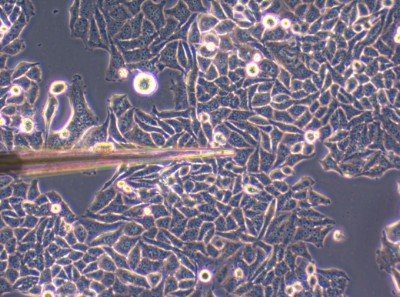The Penridge Suite, 470 Bowes Road, London N11 1NL: 18th March 2011
This event is discussion workshop. We have invited 6 experts to discuss their work in an informal lecture setting, discussion and demonstration groups, one2one sessions and panel discussions
Meeting Chair: Dr John Davis, Chairman of the UK Branch of the European Society for Animal Cell Technology.
This event has CPD accreditation
On registration please submit your questions to the panel that will be asked by the chair on the day of the event
9:00 – 9:30 Registration
9:30 – 9:45 Introduction by the Chair: Dr John Davis, Chairman of the UK Branch of the European Society for Animal Cell Technology
Talks by Invited Experts:
9:45 – 10:00 Recent Developments in Primary Culture and Cell Immortalization
Prof. Dot Bennett
Professor of Cell Biology, University of London, UK
We have been preparing cultures from human pigmented skin lesions: melanomas and naevi (moles), to investigate at what stage of progression the cells become immortal. (Most melanoma metastases seem to contain immortal cells.) Among the challenges, sample size can be very small and the cells often do not grow well. They may need the support of feeder cells. Naevus cells senesce rapidly or are already senescent. Primary melanomas may initially grow well but often arrest later, as if senescing. A minority of the melanoma strains produce immortal lines. Implications and technical issues will be discussed.
10:00 – 10:15 Cell Line Characterisation and Authentication
Prof. John Masters
Professor of Experimental Pathology, University College London, UK
Human cell lines are often derived from a different individual or species to that claimed. If a cell line is being used as a disease model (eg testing drugs for human breast cancer) and is not human in origin or derived from breast cancer, the data will be of little or no value. Such problems can be circumvented using STR profiling to authenticate the cells. The talk will cover the history and incidence of cross-contamination of cell lines and introduce the method of STR profiling.
10:15 – 10:30 Advances in the Microscopy of Living Cells
Cancer Research UK, London Research Institute
General and specialised imaging methodologies for light microscopy with live cells will be presented with reference to metastatic cells and include essential auxiliary technologies. Phase contrast microscopy reveals morphology and information on dynamic behaviour such as motile responses of cells. Fluorescence microscopy images specific subcellular structures and characterises intracellular mobility of fluorescently labelled molecular species. Specialised techniques, such as Fluorescence Localisation After Photobleaching assesses intracellular delivery of fluorescently labelled molecules with absolute as well as relative quantitation. Such a quantitative analysis requires computer image processing, appropriate statistical techniques, with interpretation facilitated by computer simulation.
10:30 – 10:45 New Approaches to the development of Chemically Defined Animal Component Free Media
Dr Jonathan Dempsey
Traditionally media has been developed by evaluating single components using dose response curves, or mixtures of simple media. Although successful this has led to increasingly comple formulations that may have detrimental physiological effects o the cells. Here I will demonstrate novel methods of medium design, formulation rationalisation and development that has yielded great benefits in protein expression, manufacturability and further optimisation and process development
10:45 – 11:00 Scale Up of Mammalian Cell Fermentations
Dr Phil Mellors
Eden Biodesigns, UK
Scale up of fermentations can be a daunting prospect for bioprocess engineers and fermentation scientists alike. Over the years numerous strategies have been developed, each with their own complexities and challenges. In this presentation we will cover the basics and walk through the activities required to scale up a mammalian cell fermentation process.
11:00– 11:15 Cell-Based Assays and their Use in Drug Discovery
Dr Darren Cawkill
Associate Director, Research Enabling Group, Pfizer, UK
In early drug discovery, cells are a critical reagent for driving the screening of drug like molecules and characterising their impact on biological target function. This presentation will outline the cell culture related approaches and technologies employed at Pfizer Sandwich in support of this work. Topics that will be covered include the generation of engineered cell lines, large-scale production of cells for plate-based screening, automation and the use of native cell types.
11:15 – 11:20 Participant Photo
11:20 – 11:45 Mid-morning Break
11:45 – 12:45 Question and Answer Session
12:45 Working Lunch (in Exhibition Area)
13:00 – 16:30 Discussion Groups and One to One Sessions
- Round table discussion groups will be throughout the afternoon
- Delegates will rotate at 15 minute intervals so that they may participate in all the discussion tables
- All delegates will also be allocated an slot to visit the exhibition stands
- One to one sessions can also be held after lunch (in parallel to the discussion groups)
- Where appropriate delegates will be able to bring their samples to the discussions
Table 1: Title TBC
Hosted by John Davis who is a Visiting Lecturer in Biotechnology at the University of Hertfordshire, and Chairman of the UK Branch of the European Society for Animal Cell Technology (ESACT-UK). After a degree in Biochemistry at Sheffield, he moved in 1974 to Renato Dulbecco’s laboratory where he was initiated into the art of cell culture. Following PhD studies in Leicester, he moved to Switzerland, working with both Norman Iscove and Georges Köhler, the latter starting him on his many years of research into the use of monoclonal antibodies, particularly in therapy. After a further postdoctoral position, at the University of Cambridge where he worked on the early stages of the development of Campath (Alemtuzumab), he made the transition to industry, working first for PA Technology and then (for nearly 20 years) for the Bio-Products Laboratory. In 2007 he made the transition back to academia. In addition to undergraduate and postgraduate teaching, he now runs open courses on Basic Cell Culture and Intermediate/Advanced Cell Culture. He has served on both the UKCCCR subcommittee on the Use of Cell Lines in Cancer Research, and the EC task force on Good Cell Culture Practice. In addition he has edited a number of books on cell culture, including Basic Cell Culture: A Practical Approach, and (with Glyn Stacey) Medicines from Animal Cell Culture. His most recent book is Animal Cell Culture: Essential Methods, which will be published in early 2011 by Wiley-Blackwell
Table 2: Recent Developments in Primary Culture and Cell Immortalization
Hosted by Dot Bennett, Professor of Cell Biology at St George’s, University of London, and past President of the International Federation of Pigment Cell Societies. Her research career, in London and California, has often focussed on novel cell culture techniques. In early research with Renato Dulbecco, she identified and cultured mammary epithelial stem cells. Later as an independent researcher she developed methods to immortalize normal human and mouse melanocytes and their precursors, isolating many lines from pigmentary mutant mice and analyzing the actions of the mutations and genes. Another interest is the relation of cell senescence to melanoma progression and therapy
Table 3: Cell-Based Assays and their Use in Drug Discovery
Hosted by Darren Cawkill, who has been at Pfizer in the UK for 9 years. On completing his PhD in 1998, he joined Pfizer from the University of Leeds and has since worked in the fields of protein biochemistry, cell biology and in vitro screen development. His current role is that ofleading a group developing and supplying cell based reagents for compound screening at Sandwich, an area of particular current interest is investigating more physiologically relevant model systems for biological targets that are amenable to screening
Table 4: Cell Line Characterisation and Authentication
Hosted by John Masters, Professor of Experimental Pathology and Head of the Research Department of Urology at University College London. He has extensive experience of primary human cell culture and cell lines. He has edited 7 volumes of the Springer book series “Human Cell Culture”, is editor-in-chief of “Cell Biology and Toxicology” and has written several articles on tissue culture in Nature Protocols and discussion papers on the use of cell lines in various Nature Review journals. He is currently chairing a committee developing an American Standard for the authentication of human cell lines.
Table 5: Advances in the Microscopy of Living Cells
Hosted by Daniel Zicha, who received an MSc from Czech University of Technology with thesis “Expert system for genetic diagnosis”. He then pursued PhD project on “Artificial intelligence methods in tumour cell biology” at Institute of Molecular Genetics, Czech Academy of Sciences. His subsequent postdoctoral post, focussing on chemotaxis and development of interference microscopy, was held at MRC Unit, King’s College, London, UK. Daniel Zicha is head of Light Microscopy at CR-UK London Research Institute since 1998. He has been involved in metastasis research, and development of quantitative techniques such as FLAP. Daniel Zicha has been on Journal of Microscopy editorial board since 2007.
Table 6: New Approaches to the development of Chemically Defined Animal Component Free Media
Hosted by Jonathan Dempsey, a Process Science Fellow for Invitrogen’s PD-Direct Services, joining Invitrogen in 2007 after over 15 years spent working in the Biopharmaceutical industry, where he gained tremendous experience in the development of microbial and cell culture manufacturing processes and cell lines. Jon has also been directly involved in the development of several commercial biotherapeutics. Jon’s current responsibilities are to advise and assist European biotechnology companies in developing products and processes for the manufacture of biotherapeutic manufacturing processes.
Table 7: Scale Up of Mammalian Cell Fermentations
Hosted by Phil Mellors, who is responsible for Eden Biodesign’s in house upstream development programs and management of its outsourcing requirements. The upstream development group has capabilities in molecular biology, cell line construction (microbial and mammalian), fermentation development, scale up and transfer into Eden’s GMP facilities. The group is also responsible for upstream bioprocess characterisation and validation.
Prior to joining Eden, Phil led the bioprocess development team at Renovo PLC and has held positions at Lonza Biologics, CellTech-Medeva. Phil graduated with an Applied Biology degree from the University of Coventry in 1997.
16:30 – 17:00 Expert Panel’s Summing Up
17:00 Chairman’s Summing Up
Connect with us on
Nature network - http://network.nature.com/groups/euroscicon/
- http://www.linkedin.com/groups?gid=1939569
- http://www.facebook.com/group.php?gid=70847076549
- http://twitter.com/Euroscicon/
Sponsors
Dont forget to sign up to Euroscicons’ e-newsletter at www.euroscicon.com/signup.htm to keep up to date with European Life Science news and events and to be notified of the follow up to this event
This meeting was organised by Euroscicon (www.euroscicon.com), a team of dedicated professionals working for the continuous improvement of technical knowledge transfer to all scientists. Euroscicon believe that they can make a positive difference to the quality of science by providing cutting edge information on new technological advancements to the scientific community. This is provided via our exceptional services to individual scientists, research institutions and industry.
Registration Web Site: www.regonline.co.uk/workcell2011






















